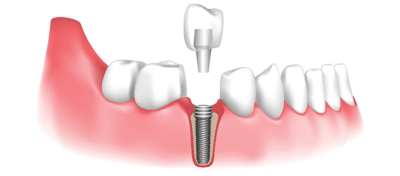Implants
What are Dental Implants?
Dental implants are small, durable titanium screws that are surgically placed into the jawbone to replace the roots of missing teeth. This creates a strong foundation for attaching artificial teeth. To make the implant blend in with your natural teeth, your dentist will fit a dental prosthesis over it, which could range from a single porcelain or ceramic crown to a full set of teeth supported by multiple implants. For full sets, the prosthesis may include both pink and white acrylic components to mimic both the gums and teeth.
Do I Need a Dental Implant?
During your consultation, your dentist will assess your individual needs and suggest the most suitable treatment. A dental implant may be recommended for the following conditions:
- Bone Atrophy:
When a tooth is lost, the jawbone that once supported it can begin to deteriorate due to lack of stimulation. This bone loss can cause a sunken or aged appearance in the face and jaw, similar to muscle atrophy. - Unstable Teeth:
Teeth are held in place by the ones around them. Missing a tooth can cause neighbouring teeth to shift, become unstable, or slant, impacting both the appearance and function of your smile. - Unstable Dentures:
Dentures can sometimes become loose or unstable at inconvenient times. Stabilising a full denture with dental implants not only ensures it stays in place but also makes speaking and chewing easier and more comfortable. - Severely Decayed Teeth:
When a tooth is badly decayed and beyond saving with a root canal, a dental implant may be recommended to preserve jawbone integrity and restore the function of the area.
What is the Dental Implant Process?
We treat each patient individually, tailoring each treatment plan to their unique needs. The dental implant procedure is carried out in five phases, each one essential to achieving the best results:
- Consultation and Assessment:
In your initial consultation, your dentist will examine your mouth and determine the most appropriate approach for your treatment. - Treatment Planning:
Effective treatment relies on careful planning. We collaborate with specialists and laboratory technicians to ensure the right outcome at the right time and cost. - Surgical Phase:
When it comes to placing the implant, we refer our patients to see a specialist. They have access to the latest technology and vast knowledge to go hand in hand with that. The treatment is performed in a sterile environment. Implants can be placed on two separate occasions:
- On the same day as the tooth is removed
- Once the tooth has been removed and the bone/ gum has healed. Typically, this occurs 10-12 weeks after the tooth extraction. If bone remodelling occurs after extraction, additional bone or gum tissue may be needed.
The specialist will continue to review the implant until healing is complete and they deem it stable enough to continue to the next phase.
- Restorative Phase:
Once the implant integrates with the bone (usually within 3-6 months), a prosthesis such as a crown will be attached by your dentist. A healing cap (a small screw cover) will be placed during the healing period. If we are replacing a front tooth, we will replace the tooth with a temporary denture to restore function and aesthetics during the healing period. The final crown will be carefully customised in terms of size, shape, and colour to match your natural teeth.
Maintenance:
After placement, it’s important to maintain the health of your dental implant. Regular brushing and flossing, along with professional check-ups twice a year will help keep your implant functioning well throughout its lifetime.




